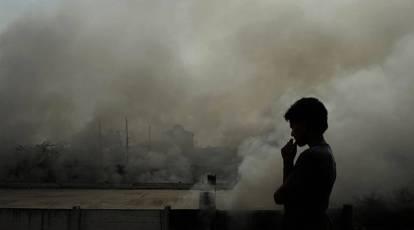Haryana’s Chief Secretary T V S N Prasad stated on Monday that the state government intends to implement a 10,000-crore project with funding from the World Bank to tackle air pollution.

The Haryana Clean Air Project for Sustainable Development will now be carried out in the state in phases with the first phase to be done in the districts that are in the NCR and then replication will be done across the whole state, he said.
The announcement was made in a meeting of the governing committee of Haryana Clean Air Project for Sustainable Development held under the chairmanship of the chief secretary here on Monday, official sources said. He explained that this was a ten-year comprehensive project which would be funded by the World Bank.
Stressing the importance of the project, Prasad noted that it is important to address the issue of air pollution and all the stakeholders must come together to do this.According to the officials in the meeting, the project has three major objectives towards multi-sectoral approach to mitigate air pollution, the statement stated.
The first step proposes upgrades to the current air quality monitoring system in Haryana.This includes the construction of a new advanced laboratory and the upgrade of four others. Moreover, a separate programme management unit will also be created for proper management of the project’s execution, it further said.The initiative also entails Stakeholders’ training programmes on matters concerning air quality management as stated in the release.
“Understandably, since air pollution has many roots, the project devotes most of its resources directly to the problems of transport, industry, construction, and road, biomass burning, and residential pollution by sector. ”The project aims to encourage the use of cleaner vehicles on the roads through the electrification of fleets used in intra and inter-city commutes. It seeks to encourage private four-wheeler vehicles use particularly the three-wheelers and four-wheelers taxi.
Higher incentives for scrapping old jalopies: to encourage the removal of old, less-efficient cars and reduce emissions further, financial bonuses would be provided for trading in clunkers for EVs. Also, the Rwandan government stated that a model for establishing the automated testing stations (ATS) would be developed for monitoring vehicle health.
Incidentally, industries will also be motivated to use clean energy through provision of subsidies for firms willing to change to clean fuels for boilers and by encouraging industries to use cleaner diesel generator sets either through retrofitting them or sourcing for new diesel generator sets that have been produced to meet cleaner standards.In response to the above concern about the high contribution of this sector to air pollution, measures will aim to enhance the spread of the green areas in the cities through the creation of the biodiversity parks and green belting.
The project will also seek ways to prevent the practice of burning crop residues, in order to reduce air pollution through proper management. This includes increasing awareness on bio-decomposers that help in the speedy decomposition of crop residue and its subsequent reduction through burning.
According to Prasad, the Haryan government has leap forward in placing institutional structure for air quality assessment and evaluation.
In order to test the samples, four state laboratories are in place in the state. In addition to this, the government says there is 29 Continuous Ambient Air Quality Monitoring Stations (CAAQM) and 39 Manual Ambient Air Quality Monitoring (MAAQM) station in various districts as well.